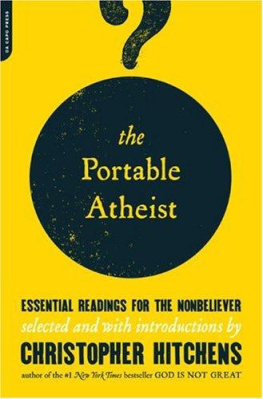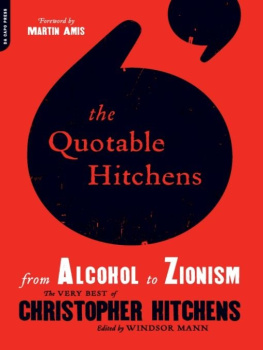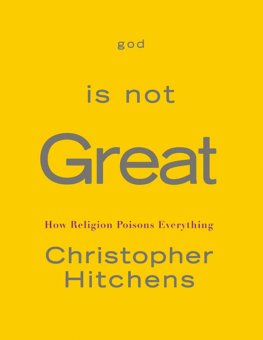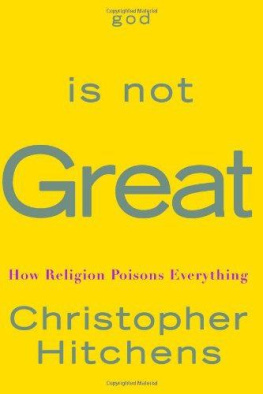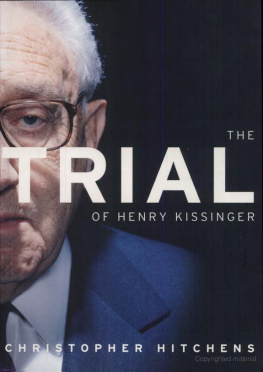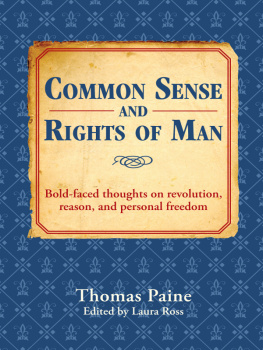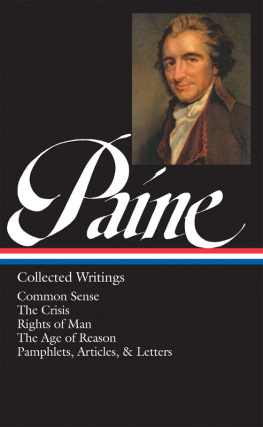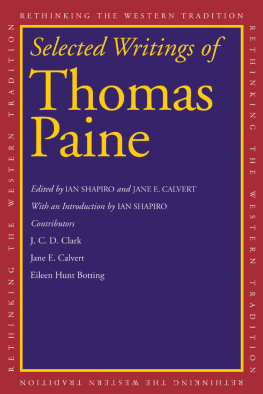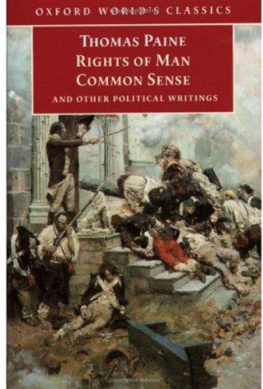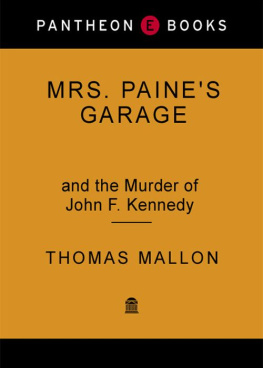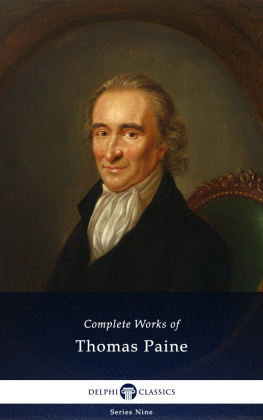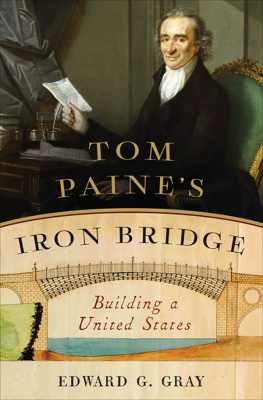
Thomas Paines Rights of Man
A Biography
Current and forthcoming titles in the Books That Changed the World series:
The Bible by Karen Armstrong
Machiavellis The Prince by Philip Bobbitt
Platos Republic by Simon Blackburn
Darwins Origin of Species by Janet Browne
The Quran by Bruce Lawrence
Homers The Iliad and the Odyssey by Alberto Manguel
On The Wealth of Nations by P. J. ORourke
Clausewitzs On War by Hew Strachan
Marxs Das Kapital by Francis Wheen
Thomas Paines Rights of Man
A Biography
CHRISTOPHER HITCHENS

Copyright 2006 by Christopher Hitchens
All rights reserved. No part of this book may be reproduced in any form or by any electronic or mechanical means, or the facilitation thereof, including information storage and retrieval systems, without permission in writing from the publisher, except by a reviewer, who may quote brief passages in a review. Any members of educational institutions wishing to photocopy part or all of the work for classroom use, or publishers who would like to obtain permission to include the work in an anthology, should send their inquiries to Grove/Atlantic, Inc., 841 Broadway, New York, NY 10003.
The author and publishers are grateful to Dwarf Music for permission to reproduce material from As I Walked Out One Morning copyright 1968 by Dwarf Music.
All rights reserved. International copyright secured.
Reprint by permission.
Printed in the United States of America
FIRST PAPERBACK EDITION
eBook ISBN-13: 978-1-5558-4927-6
Design by Richard Marston
Grove Press
an imprint of Grove/Atlantic, Inc.
841 Broadway
New York, NY 10003
Distributed by Publishers Group West
www.groveatlantic.com
Dedicated by permission to President Jalal Talabani: first elected president of the Republic of Iraq; sworn foe of fascism and theocracy; leader of a national revolution and a peoples army. In the hope that his long struggle will be successful, and will inspire emulation.
Pains wild rebellious burst proclaims her rights aloud
William Wordsworth: Descriptive Sketches
As I walked out one morning, to breathe the air around Tom Paines
Bob Dylan: As I Walked Out One Morning
To all these champions of the oppressed Paine set an example of courage, humanity and single-mindedness. When public issues were involved, he forgot personal prudence. The world decided, as it usually does in such cases, to punish him for his lack of self-seeking; to this day his fame is less than it would have been if his character had been less generous. Some worldly wisdom is required even to secure praise for the lack of it.
Bertrand Russell: The Fate of Thomas Paine
CONTENTS
INTRODUCTION
Children in the United States are taught early in life to sing My Country, tis of thee, in which the main verse goes:
My Country, tis of thee
Sweet land of liberty
Of thee I sing
Land where my fathers died
Land of the Pilgrims pride
From every mountainside
Let freedom ring!
This is an averagely sentimental ditty, but it was promoted to immortality by the great Dr Martin Luther King, in the imperishable speech that he made on the steps of the Lincoln Memorial, at the climax of the civil rights March on Washington in the spring of 1963. Seizing the familiar words of the schoolroom for his peroration, he demanded that freedom should ring from every hilltop, north and south, from New Hampshire to California and down to Mississippi, until the original promise of the United States had been kept for all its citizens. If America is to be a great nation, he proclaimed, this must become true.
My Country, tis of thee would be a fairly easy song for British schoolchildren to master as well. It is sung, for one thing, to the tune of the National Anthem. This rather unimaginative hymn the first national anthem in the world, as it happens seems to have originated as a Jacobite chanson, but was rewritten for the cause of (Protestant) Church and King in September 1745, as the Jacobite rebel invaders from Scotland were menacing the throne. A theatre audience in London rose to intone, as well as the first verse, the less commonly heard second one:
O Lord our God arise,
Scatter his enemies
And make them fall:
Confound their politics,
Frustrate their knavish tricks
On him our hopes are fixd
O save us all.
The him in this case was George II, representative of the Hanoverian usurpation that endures on the British throne to the present day. By the early 1800s his son, George III, was being greeted by this song on official occasions. And by that time, another version was in circulation, written by the great radical artisan poet Joseph Mather:
God save great Thomas Paine,
His Rights of Man explain
To every soul.
He makes the blind to see
What dupes and slaves they be,
And points out liberty
From pole to pole.
Thousands cry Church and King
That well deserve to swing,
All must allow:
Birmingham blush for shame,
Manchester do the same
Infamous is your name,
Patriots vow.
Pull proud oppressors down,
Knock off each tyrants crown,
And break his sword;
Down aristocracy,
Set up democracy,
And from hypocrisy
Save us good Lord.
Why should despotic pride
Usurp on every side?
Let us be free:
Grant freedoms arms success,
And all her efforts bless,
Plant through the universe
Libertys Tree.
Facts are seditious things
When they touch courts and kings,
Armies are raised,
Barracks and Bastilles built,
Innocence charged with guilt,
Blood most unjustly spilt,
God stands amazed.
Despots may howl and yell,
Though theyre in league with hell
Theyll not reign long;
Satan may lead the van,
And do the worst he can,
Paine and his Rights of Man
Shall be my song.
This fine parody, composed in 1791, is taught in no school and sung in no assembly. But it captures, with its defiant and satirical pugnacity, the spirit that was aroused that year by the publication of Thomas Paines classic. Joseph Mather was a radical file-maker in the city of Sheffield; one wonders whether he inspired, or whether he drew from, the song that was struck up at an evening of the more mainstream Society for Constitutional Information, which at its London meeting in March 1791 voted its thanks to Paine and then heard members of the successful majority intone:
God save The Rights of Man!
Let despots, if they can,
Them overthrow
It seems likely that Mather was writing later in the year, since it is easy enough to interpret his apparently odd phrase Birmingham blush for shame. It was in Birmingham in the autumn of 1791 that a Tory-inspired mob, frenzied by the cry of Church and King, broke into Joseph Priestleys house, destroying the library and laboratory of the self-taught scientist who had discovered oxygen. This incident another of those historical episodes that is not taught in school decided Priestley on a move to America, whose revolutionary and republican cause he had already espoused in a pamphlet. He was there to become a welcome guest, and a participant in the great Philadelphia renaissance that featured such men as Benjamin Franklin, Benjamin Rush and Thomas Jefferson. One should not allow oneself to forget that the English friends of the revolutions in America and France were not always greeted only with the high moral tones of Edmund Burke (who approved of the Church and King mobocracy when the mob was on his side) but also with persecution and repression of quite a high and systematic degree.
Next page

